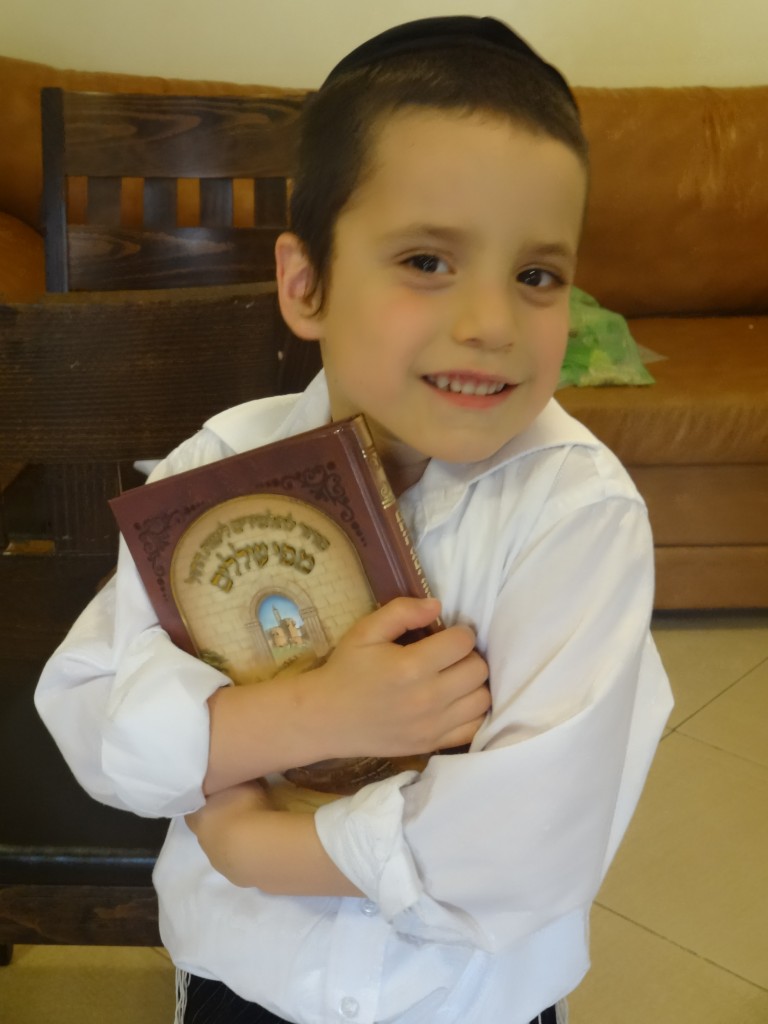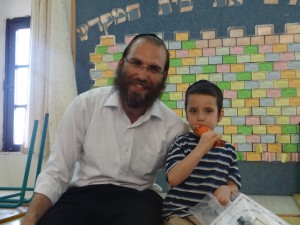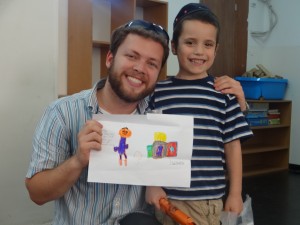Shalom Gershon’s experience here was different from Yitzi’s but, in the end, also very successful. In Chicago, he would have been in “nursery” – a pre-kindergarten co-ed class with minimal academic content. We had expected to place him in gan (literally “garden”) here, which would have been a similar experience. But Zilberman’s wanted him in mechina (literally, “preparation”). Mechina is more like kindergarten-plus, with a rebbe and a focus on reading.
Shalom Gershon struggled in the early-going with the language barrier (even though he also had some English speakers in his class). He did figure out what was going on, and he managed to make a good connection with his rebbe, and to feel safe and happy with him. But he was initially very resistant to doing his “homework” – i.e., practicing the Hebrew letters they were learning – or hearing any Hebrew at home. He didn’t seem to undergo the same bit of hazing that Yitzi did, but we did get accounts of how one of the boys in his class (Yosef Abboud) protected him from boys who wanted to bother him. However, we weren’t sure how much of this was accurate given the fine line in his mind between fact and imagination. In fact, Shalom Gershon would frequently come home with elaborate accounts of the things his rebbe had said in school that day – even though his rebbe speaks maybe three words of English and Shalom certainly did not understand the Hebrew.
Things changed when an English-speaking aide, Rebbe Yedidia joined the class. Shalom Gershon became willing to practice (usually), and did an impressive job keeping up with the pace of the class. He also totally charmed Rebbe Yedidia with the sweet things he says, which we’d hear about every time we ran into Rebbe Yedida on the street. Shalom can now read (slowly) in Hebrew, including the full paragraph of text before Friday night kiddush, which he did last Shabbos. Although he doesn’t speak like Yitzi, Shalom does understand a fair amount of Hebrew, and speaks a bit occasionally. Interestingly, he seems to have learned differently from Yitzi. For Yitzi, the experience was more conventional, as he picks up new vocabulary and works it into the structure of the language, etc. But Shalom Gershon has learned to understand phrases and terms, and associate them with their meanings. For example, he knows that “sim b’pach” is an instruction to throw something in the garbage, but he doesn’t recognize the separate words as such. You could tell him to “sim b’mita” and, even though he knows that a mita is a bed, he wouldn’t necessarily recognize that you’re telling him to put the thing in the bed.
He is also attached to Israel, though it is hard to tell how much of that is a five-year-old’s aversion to change. And we wonder how well he really even remembers Chicago. But he said the other day that he’d rather live right here, and he’s going to miss Israel. He also complained that he needs to stay here to learn to daven like the Israelis do. He also professes great interest in places that are kadosh (holy). After being anxious about his happiness and experience here, it’s a relief to see what a good year it has been for him.
Needless to say, he’s well ahead of where he’d be in Chicago. In fact, we’re worried about how bored he will be this year in “pre-1A” (the inexplicable term used in the boys’ school for kindergarten). They’re going to be focused on learning Aleph-Beis (the Hebrew alphabet), but he can already read – in an Israeli accent, to boot!



